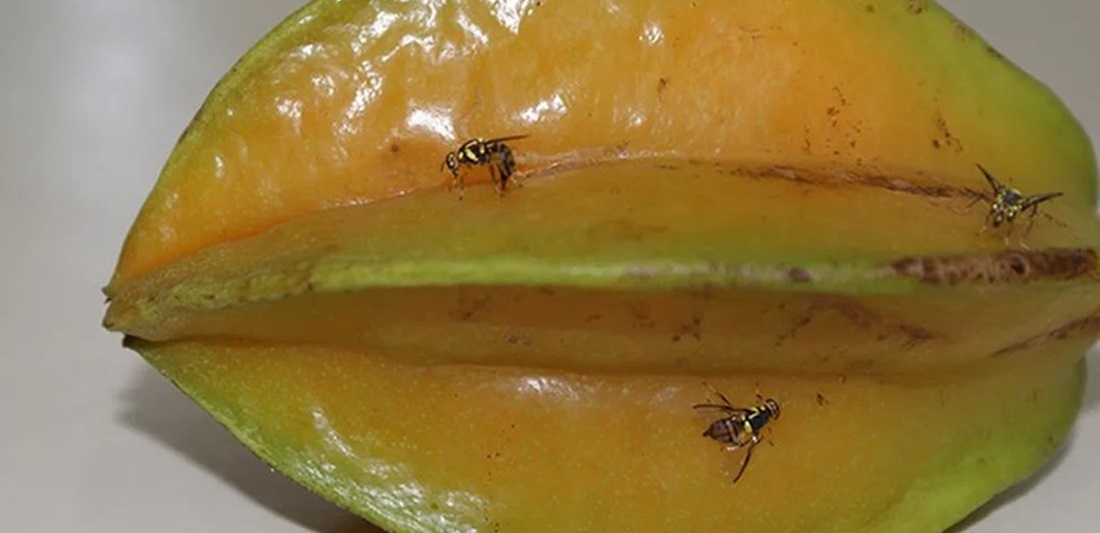
Fruit fly poses BRL 400 million threat to fruit exporters in Brazil; gov’t declares emergency state
Nov, 21, 2023 Posted by Gabriel MalheirosWeek 202343
Detected in Brazil for the first time in 1996, the fruit fly, also known as the ‘damned fly’ (Bactrocera carambolae, Drew & Hancock), has experienced a dangerous population increase in recent months. This situation prompted the government to declare a phytosanitary emergency in the states of Amazonas, Pará, Roraima, and Amapá, reinforcing monitoring and combat efforts against the species’ proliferation. If it spreads throughout the country, studies indicate a potential annual loss of up to R$400 million in Brazilian fruit exports.
The fruit fly attacks at least 23 types of fruits in Brazil, especially fleshy ones like starfruit, mango, guava, java apple, and acerola. These fruits serve as hosts for the fly’s larvae, which consume the fruit pulp until it prematurely falls to the ground, typically spoiled. Considered one of the world’s most dangerous fruit pests due to its voracity and ease of reproduction, a female can lay 1,200 to 1,500 eggs throughout her life.
Originally from Asia, the fly was first identified in Brazil in Oiapoque in 1996. Since then, the government has been working with the Bactrocera carambolae Subprogram to eradicate the species or prevent its spread to other states. Therefore, it is prohibited to transport fruits from Amapá to other states in the country. Since April, this quarantine area has been expanded to Roraima, and, in the decree published last November 13 along with the one-year emergency declaration, the prohibition has been extended to 26 municipalities in Pará.
Captures near the Amazon
Due to the need for surveillance, there are 9,625 traps installed throughout Brazil to capture and monitor the species. In recent months, there has been a significant increase in captures in the cities of Terra Santa and Oriximiná, near the border of Pará with Amazonas, raising the alert and justifying the unprecedented emergency declaration, explains Graciane Castro, General Coordinator of Plant Protection at the Ministry of Agriculture and Livestock (Mapa).
— The emergency state was necessary because the risk of dispersion to other states increased considerably — says Castro, mentioning that the increase in captures has been happening since last year. — As it is a fruit fly, it follows human circulation throughout the country. It can be in a mango, and a person might carry it unknowingly. This internal circulation is one of the issues, and the other was the recent increase in immigrants from Venezuela, Guyana, and Suriname, countries where the fly is prevalent.
Of the four states where the emergency was declared, the species only does not occur in Amazonas. Still, the stat was included because of its proximity to the municipalities where captures took place, so surveillance may be reinforced there. Additionally, in areas where the fly exists, the government will increase combat actions, applying products and collecting dead fruits. Another concern is that new captures occurred near Santarém, a tourist municipality with a high influx of people.
The emergency declaration also aims to mobilize the academic community and the private sector, explains Castro, in developing biological control actions, such as introducing predator species, which is not yet done in Brazil.
Million-dollar losses
In recent years, the control program has managed to prevent the arrival of the carambola fruit fly in the main fruit-growing regions of the country, such as the Vale de São Francisco (Bahia and Pernambuco), as well as other regions in the Northeast, Southeast, and South. In the North, the main region is in Pará, but so far, the occurrence is more restricted to indigenous territories and residential areas without affecting large commercial centers.
A study by Embrapa has already indicated a potential loss of R$400 million per year for the sector if it spreads throughout the country.
— The numbers are alarming. About 80% of the fruit sector consists of small and medium-sized enterprises or family agriculture, so the socio-economic impact would be enormous. That’s why the adoption of a long-term government program to combat it is needed — explains Graciane Castro.
Source: Extra
Click here to access the original text: https://extra.globo.com/blogs/radar-brasil/post/2023/11/disseminacao-de-mosca-maldita-no-pais-pode-causar-prejuizo-de-r400-milhoes-por-ano-nas-exportacoes-de-frutas-governo-declara-emergencia.ghtml
-
Grains
Apr, 30, 2019
0
Recife Port receives corn shipments from Argentina
-
Trade Regulations
May, 21, 2024
0
Brazilian Gov’t launches manual on Rules of Origin for imports
-
Coffee
May, 27, 2021
0
Coffee prices up 30% in 2021
-
Environment
Sep, 19, 2023
0
CMA CGM and Maersk team up in decarbonisation drive

